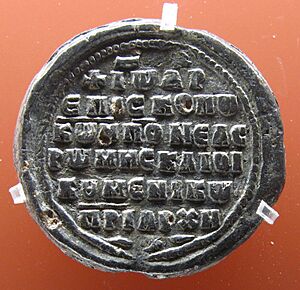John VIII of Constantinople facts for kids
Quick facts for kids John Xiphilinos |
|
|---|---|
| Ecumenical Patriarch of Constantinople | |

Seal
|
|
| Church | Eastern Orthodox Church |
| In Office | 1 January 1064 – 2 August 1075 |
| Predecessor | Constantine Leichoudes |
| Successor | Cosmas I |
| Personal details | |
| Born | c. 1010 Trebizond (modern-day Trabzon, Turkey) |
| Died | 2 August 1075 Constantinople (modern-day Istanbul, Turkey) |
| Education | University of Constantinople |
| Sainthood | |
| Feast day | August 30 |
| Venerated in | Eastern Orthodoxy
Philosophy career |
| Institutions | University of Constantinople |
| Notable students | Michael Psellos |
|
Main interests
|
Jurisprudence |
John VIII Xiphilinos (born around 1010 – died August 2, 1075) was an important leader in the Eastern Orthodox Church. He came from Trebizond and was a very smart person, known for his knowledge of law. From 1064 to 1075, he served as the patriarch of Constantinople, which is like being the main bishop of a large church area. He was also the uncle of another famous person named John Xiphilinus. People remember him for finding new ways to study and understand laws.
Contents
John's Early Life and Studies
John Xiphilinos was born in a city called Trebizond. He went to school at the famous University of Constantinople. There, he became a top expert in law. He even became the nomophylax, which was the head of the law school.
Becoming a Monk and Patriarch
Later in his life, John became a monk. This meant he dedicated his life to religious service. Emperor Constantine X Doukas (who ruled from 1059 to 1067) chose John to become the patriarch of Constantinople. This was a very important position, making him a spiritual leader for many people. He took over from Constantine Leichoudes.
His Time as Patriarch
As patriarch, John VIII Xiphilinos had many important duties. One notable event happened in 1072. He led a meeting of church leaders, including metropolitans (main bishops of cities) and archbishops (senior bishops). This meeting took place at a special church building called an oratory, dedicated to Saint Alexius.
Rules for Electing Bishops
The main topic at this meeting was how to choose new bishops when a church position became empty. Before John, a patriarch named Michael Keroularios had made a rule. This rule said that metropolitans who lived in Constantinople could not vote in these elections.
However, John VIII understood that sometimes these metropolitans had to stay in the capital for a long time. This could be because of church business or if they were sick. So, with John's agreement, the assembly decided to change the rule. Metropolitans could now vote in elections while living in Constantinople, as long as they told the patriarch beforehand. This made the process fairer.
Legacy and Sainthood
John VIII Xiphilinos also wrote a special kind of book called a hagiography. This book told the life story of Saint Eugenios of Trebizond, a local saint from John's hometown.
After his death on August 2, 1075, John VIII was buried at the Angourion monastery. He is honored as a saint in the Eastern Orthodox Church. His special day, called a feast day, is celebrated every year on August 30.
 | Mary Eliza Mahoney |
 | Susie King Taylor |
 | Ida Gray |
 | Eliza Ann Grier |

